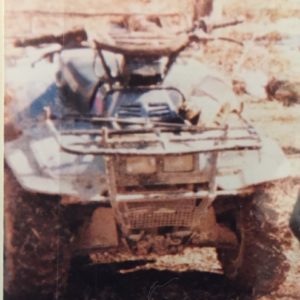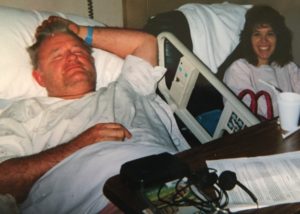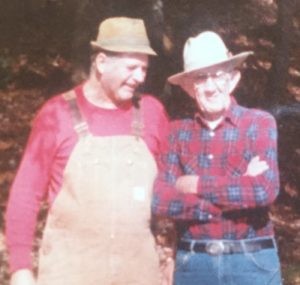It was dusk dark when Brother Dave arrived at Red Hill, a couple of miles from our cabin at Snowbird, and parked. No way his car was coming up that logging road, up Sassafras Ridge, to the cabin, so I got on a four-wheeler and drove down the mountain to pick him up.
Dave was a big guy, 270, 275 pounds and the KingQuad was not built to carry two people. Even so, we often rode double — it was either that or walk.
By the time we got back to Big Rock, a half a mile or so from the cabin, it was dark and I had my lights on. There was a swayback bridge right there at Big Rock and we crossed it, down, back up, and then a sharp right toward the cabin.

As I came up, out of the creek, and turned, the KingQuad slowed. I was up against something. I should have braked but I didn’t, I did just the opposite. I gave it the gas. The KingQuad climbed something, a rock? The embankment at the side of the road? And then it flipped.
There was so much weight on the back that the front wheels must have been barely touching the ground. When I turned it hard right, the KingQuad didn’t turn. And the next thing I knew Dave was rolling the machine off of me.
I was laying on my stomach, but I couldn’t get my knees under me. I couldn’t get up. I told Dave I thought my hip was broken.
There was nothing to do but wait on help to come, as it surely would when we didn’t show up back at the cabin. But that might be a while and I was getting cold, laying there on the ground. I asked Dave to build a fire and, moments later, I heard him breaking limbs. I wiggled on my stomach closer to the pile of branches, closer to the fire he was building.
I guess I had forgotten that Dave can’t build a fire without what he calls “Boy Scout Juice” — an accelerant, oil or gasoline. And I didn’t see him take off his shirt, stuff it in the KingQuad’s gas tank, and then pull it out and put it under the pile of green limbs.
When he held a cigarette lighter to the shirt, and lit it, fire leaped up and out: Whoosh!
I began wiggling again, away, as fast as I could go.
When our kinsmen found us I asked Dave to send for a sleeping bag to lift me, an air mattress to lay on, and a pickup truck to take me to a hospital and that’s what he did, and a few minutes later they lifted me onto the bed of a pickup.
Jeannie Bierce rode in the back with me. She was the age of my youngest sons and was, in some ways, like a daughter. She had come to the mountain that weekend with another woman, a colleague at the drugstore where she worked. Jeannie was a pharmacist.
Dave drove back down the mountain to Red Hill, crossed the bridge over Little Snowbird Creek, and started back up a winding dirt and gravel road, up the mountain towards Andrews, North Carolina.
It won’t long before Jeannie taped on the back window and warned him:
“He sliding out the back.”
“We’re almost to the top,” Dave said.
“He won’t make it to the top,” she said. Dave stopped, pulled me back in the truck, and shut the tail gate.

When we got to the hospital in Andrews I was lifted onto a gurney and rolled into an examining room. Jeannie went with me. It was small hospital and it was late, so there was no doctor there. There was a physician’s assistant and he was struggling to figure what was wrong with me. I told him I thought I had broken my hip but he didn’t think so.
He wanted me to sit up. I said I couldn’t do that. He said, “Yes you can, you have to sit up.” And so I did, and the pain engulfed me. I screamed to Jeannie to help me, and I heard the P.A. say, too late, “I believe you!”
Turns out I had fractured two bones on the side of my backbone. I was admitted and a doctor the nurses called “Dr. No Pain” prescribed morphine. It wasn’t long before the pain was gone and I was feeling very good.
I stayed in the hospital in Andrews for four days and then was taken by ambulance to Rex Hospital in Raleigh, where I stayed three more.
And then did I go back to work?
Oh, no. I continued my recuperation on Topsail Island, laying on the beach during the day and eating fish at night. The recovery from injuries like that can’t be rushed.
Postscript: When my wife, Donna, was told I had been hurt she drove seven hours or so to the mountains to see how I was doing. I was doing very well, thanks to Dr. No Pain.
She arrived at the hospital in Andrews early in the morning and we talked a while and caught up. I didn’t see any point in her hanging around, watching me breath, so I told her to go out and have some fun, find a yard sale or something, eat lunch at a nice restaurant.
It was dark with Donna came back to the hospital. You don’t tell my wife to go out have a good time unless you mean it.
Coming Monday: Rest In Peace
